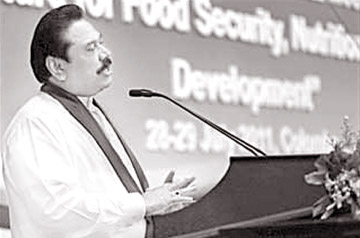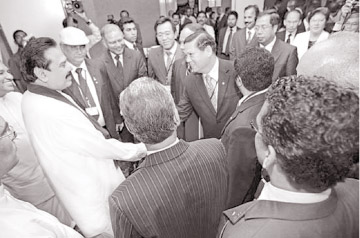Collective political commitment, a must for welfare of fisheries
sector - President
|

President Mahinda Rajapaksa delivering the keynote address.

President Mahinda Rajapaksa in conversation with some of the
foreign representatives attending the international conference.
Pic: Sudath Silva |
The keynote address by President Mahinda Rajapaksa at the Asian
Regional Ministerial Meeting on Aquaculture for Food Security, Nutrition
and Economic Development in Colombo last week We are privileged to host
this ministerial meeting at a time when we examine the opportunities and
challenges to food security in our region and the world, and realise the
potential benefits from effective aquaculture development in our region.
As an island nation, we have a very long tradition in fisheries, a
tradition that keeps expanding with growing demand for fish which forms
a very important source amounting to 70 percent of animal protein in the
national diet of Sri Lankans.
It is remarkable that the Asian region with its vast fisheries
resources produces more than 90 percent of the world’s farmed fish.
This reflects the importance of aquaculture for food security,
nutrition, and economic development. But, as in many other sectors of
food production essential to humankind, fisheries is also greatly
threatened today.
The fisheries resources are over-exploited and the physical resources
to produce more fish are fast reaching their limits to yield more under
available technology. You meet today facing the challenge of the world
having to produce 30 million more tons of fish per year by 2030 to feed
an ever growing population.
We often read today of how fish is our last wild food and that our
oceans are being picked clean. We learn of factory trawlers that scrape
the ocean floor, threatening the livelihoods of fishing communities in
countries and regions. These trawlers are commercial operations while
the small time fisherman goes out fishing as a means of day-to-day
living. This meeting is most timely because the natural habitat of fish
is being gravely threatened and aquaculture development is of special
importance.
For us to protect our fish farmers, it requires many policy
initiatives such as strong trading standards, removing non-tariff
barriers and eliminating unfair trading practices. Methods that can
improve sustainability are necessary because their absence can have
adverse effects on small farmers and fishers.
These need to be tackled with speed and great sensitivity before
vulnerable communities that depend on fishing and fish farming are
harmed.
In this context, I am pleased to learn of the approval of the Global
Aquaculture Certification Guidelines by the FAO Committee on Fisheries.
I commend FAO and urge that all of us make a commitment to implement
these guidelines in Asia. I must thank the
COFI leadership for setting
the global agenda for fisheries and aquaculture.
As aquaculture expands further out to sea, issues of responsible
management of international waters would pose a challenge to
policy-makers and planners, investors and many other stakeholders. New
policies and laws will be necessary on issues such as leasing or renting
of the sea with due protection for economic zones.
Marine stocks
We have to now face the reality that the world’s and our region’s
marine stocks are fast depleting with small and traditional fishers
facing serious livelihood problems. They make up a very large section of
the Asian workforce. Finding ways to help them is a matter of urgency.
Perhaps, one way would be to create opportunities for aquaculture and
related service industries as alternative and additional livelihoods. We
must also protect and improve our natural stocks of fish so that fishing
will continue to provide food, jobs and income.
Aquaculture can also help address important issues on the environment
and social welfare. These include climate change and problems of
greenhouse gas emissions. We must also look at aquaculture for improving
the coastal environment which is of special relevance to Sri Lanka with
the planned growth of tourism.
The growth of aquaculture needs the development of technology in all
of its sectors. It is encouraging that we in Asia are rich in related
technology and have shown our ability to develop them further and use
them for good results. But in a region that is so large it is necessary
to overcome the problem of uneven development and fully exploit the
great potential for aquaculture and to fully realise the value of this
asset.
Although fisheries is part of our lives and has been so through
history, fisheries and aquaculture are small compared to other Asian
countries and I think it will remain so. But it is a major sector for
economic growth. Though currently contributing two percent of GDP, this
can and should be improved.
In addition to the sea around us, Sri Lanka has many rivers and
lagoons and man-made lakes built for irrigation that support fish
production. These irrigation tanks have opened the possibility of a
Rice-Fish Culture. This can be a dramatic way of producing more food and
helping to improve the rice farmer’s income.
Rice-fish culture
I am happy to learn that the National Aquaculture Development
Authority (NAQDA), established by our government in 1998, in addition to
supporting our goals in aquaculture, is also working on the development
of Rice-Fish Culture as a means of giving new strength to the rural
economy.
I am also reminded of the severe drought that prevails in some
countries in the African continent and I strongly suggest that the FAO
along with the WFP and other UN agencies devise a speedy mechanism to
provide food for the people in those countries.
Sri Lanka is now catching up with what we lost during three decades
when terrorism deprived us of so much development. It prevented fishing
and fish farming in the North and the East from getting the same
attention as in other provinces. For many years, fishing in the northern
and eastern waters had to be prohibited or greatly restricted. Today,
with peace prevailing, we are moving to massive national development in
every sector including fisheries. We have given a special place for
aquaculture and fisheries for a major role in food production, job
creation and income generation. These programs are spread throughout the
country today with an added emphasis in the North and the East to give
the people there a better life, freed of the fear and threats of terror.
I wish to thank FAO for continued assistance to our efforts. On
fisheries and aquaculture, I believe that our collective wisdom,
knowledge and work will help maintain Asia’s leadership in global
aquaculture production in the coming decades. It is very important that
these same assets should be used to ensure that the countries and
provinces less developed in aquaculture are able to fully realise the
potential of their fisheries and aquaculture. Cooperation and
collaboration is of the utmost importance in this task.
It is important today to look at where we stand in regional
cooperation on aquaculture. When the Network of Aquaculture Centres in
Asia-Pacific (NACA) was established in 1990, dedicated to aquaculture
development, Sri Lanka was one of the first countries to ratify the
agreement.
It was a gesture of our commitment to practical regional cooperation
in an important area of development. Since then, NACA has become a
strong organisation that serves our region and beyond too in aquaculture
development. I am happy that NACA is now headed by a fellow Sri Lankan
Professor Sena de Silva.
Bangkok Declaration
I recall the first Conference on Aquaculture in the Third Millennium,
organised by NACA, the FAO and the Royal Thai Government in 2000 when I
had the privilege of participating as an honoured guest. The Bangkok
Declaration and Strategy, adopted at this conference, remains the core
instrument for aquaculture development. It has shown strength as an
instrument and a guide. Later, it was fortified by the consensus at the
Global Conference of Aquaculture held in Phuket in September last year.
These are milestones of success but what more can be done?
I wish to remind you that for many years, we have tried to improve
the welfare of people in fisheries and improve the productivity from the
waters to obtain a richer harvest from the sea and other sources. We
have tried many methods from policies to regulations, incentives,
subsidies, in fact, everything that public administration allows.
We borrowed expertise and technology. We sent our people abroad for
training to improve our human resources. We improved facilities for
research and technology development.
The results of all this have been mixed. We made some good inroads
but, our efforts were also challenged by social, cultural and
environmental issues. Yet, some of our projects sustained. These were
streamlined into institutional processes.
If there is a lesson I can draw from our few successes, it is that
political commitment is the key to sustaining the goal of any
initiative. Place this in the larger context of our region and political
commitment becomes an even more crucial element. This raises the
important question as to how, we in the Asian Region can direct and
sustain political leadership and commitment to fisheries and aquaculture
development.
We see from experience today that individual States can work together
more effectively to achieve common goals, especially, if they provide
the means and resources for regional associations to become stronger.
Therefore, political leadership and commitment must also be backed with
enough resources.
An expanded regional initiative can only be sustained by having both
political leadership and adequate resources. That we are not lacking in
political commitment will be seen when we adopt the “Colombo
Declaration” tomorrow. It is a political commitment to “Regional
Cooperation in Aquaculture Development for Food Security, Nutrition and
Economic Development in Asia”.
But there is another challenge. We have to provide the resources as
well. For this purpose, I think the way forward would be to establish a
Common Regional Fund that will in the future become a Common Global Fund
for responsible aquaculture.
If you think this is an idea worth looking at, I believe that in this
gathering there is plenty of experience to develop the mechanism for
such a fund. Let us not miss such a golden opportunity.
Welfare of people
FAO has shown that together we can contribute to the welfare of the
people of Asia from where aquaculture stands today and where it should
go to.
These are great goals. But my concern is that we do not have the
luxury of time to reach these stated goals. I am not unduly worried
about resources.
Together we have the people and material needed to achieve these
goals. But the challenge is how we put these resources together that are
within different borders and institutions of individual states and
territories to work towards our common objectives.
These hopes and challenges make it urgent to commit the Asian
political leadership in fisheries and aquaculture to collectively face
the problems that will diminish the welfare of our people. This is the
challenge we all face today.
There are many issues of international politics and governance that
affect aquaculture and fisheries. Product marketing in compliance with
various international trading standards is a serious problem to
developing countries and to the small scale fish farmers who produce the
most of Asia’s aquaculture output. Just as in any other agricultural
commodity, we must address this situation politically.
Let us remind ourselves that the best results come when farmers,
especially, the smallholders are empowered technologically and
politically.
It is when they have both the means and the voice. With greater
awareness and empowerment, higher standards and good farming practice,
they will not be driven out of business.
Finally, let me express my fullest confidence in the success of the
Ministerial Meeting and my great optimism that its results will
strengthen and further promote fisheries and aquaculture in Asia and
also provide effective ways to resolve the problems of overfishing and
threats faced by the world’s maritime species that are unprecedented in
human history. |

